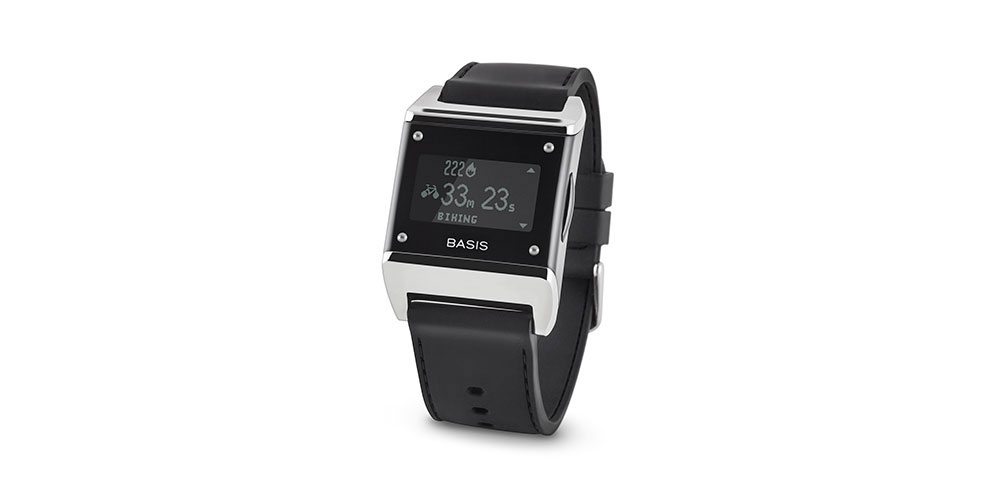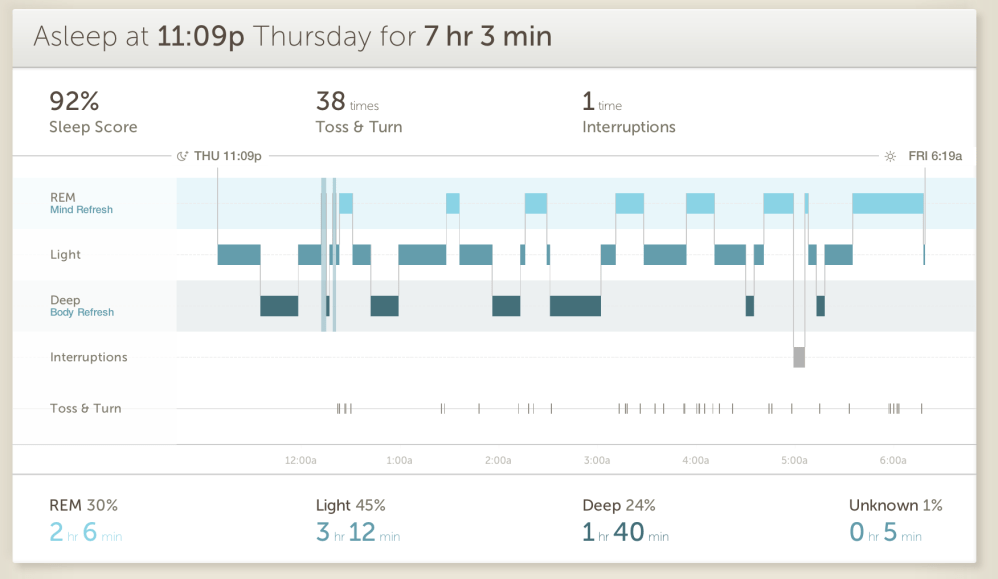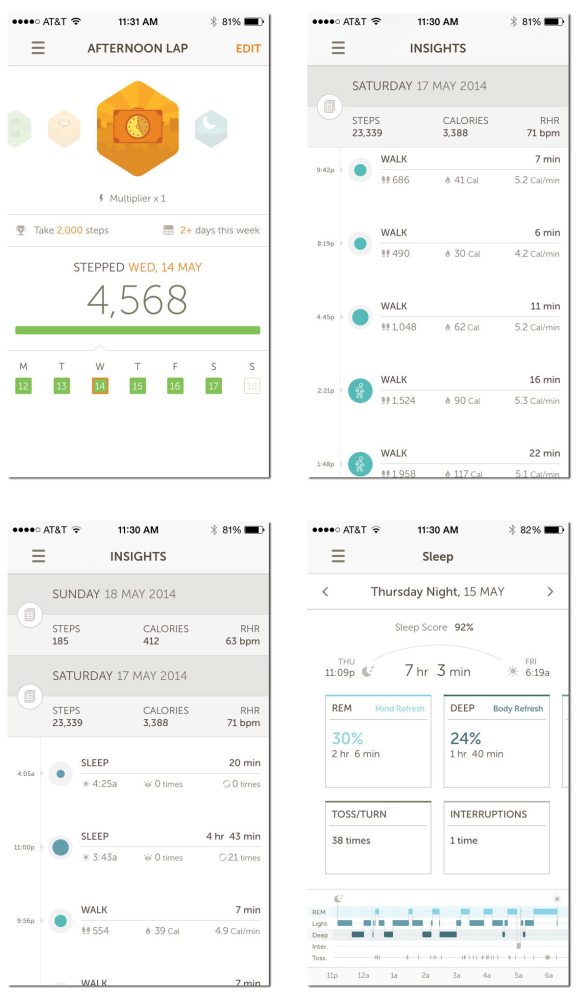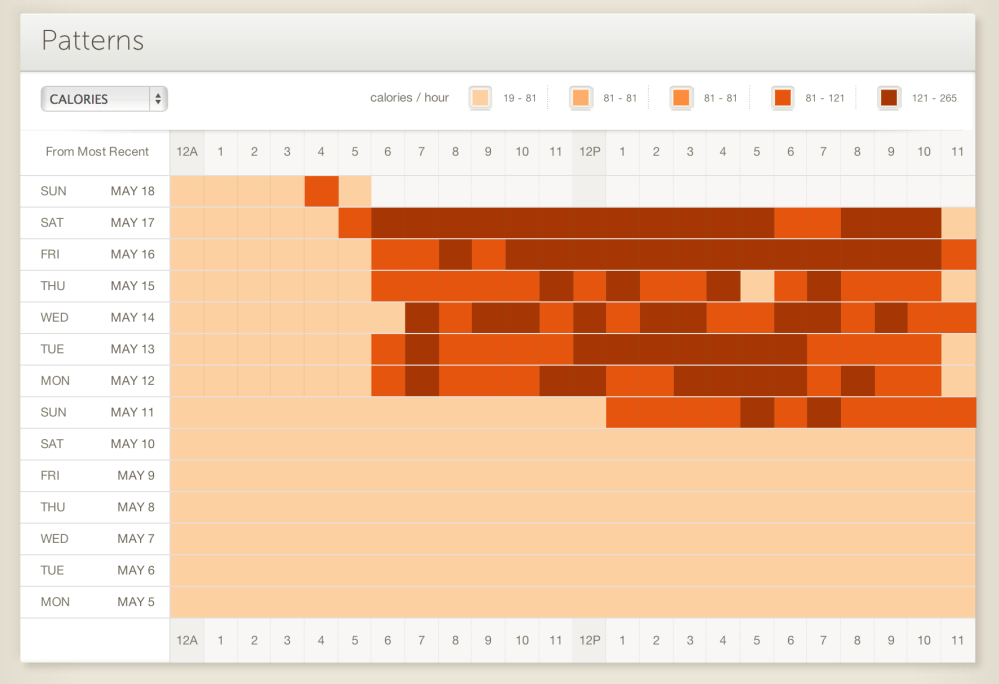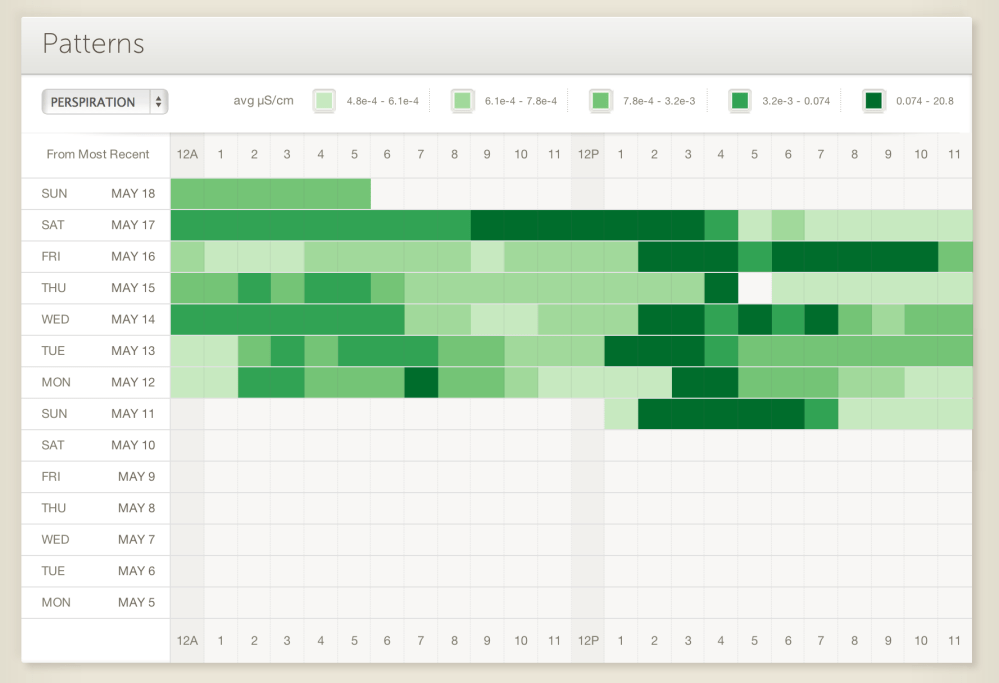I’m a big fan of personal data. It’s easy to make decisions and improve when you know more about yourself. So the building wave of personal data collection devices is pretty interesting to me. Recently, the folks over at Basis sent me their watch to try out, a device they claim is “the world’s most advanced health tracker”, which sounds pretty impressive, so let’s see if it is.
Out of the box, setup is pretty simple. Create an account on their website and pair the devices. Next, download the phone app (iOS or Android) and, pair the phone and watch. Your watch may need to be charged before use, so take the included cable and plug it into a USB jack. Once it’s ready to go, put the watch on and go about your day.
The Basis collects all kinds of information about you, your heart rate (more on that in a second), how often you are in motion, calories burned during activity, perspiration, skin temperature, and sleep cycles. All of it is captured 24/7 and it is all provided to you in charts you can evaluate. The Basis Web site has more information on the data that’s collected, how it’s collected, and other technical specifications.
What part of the day are you most active? How well do you sleep? Do certain events or times of day stress you out? These are just some of the questions that Basis can help you understand and find answers to. But that’s just part of the program. Where Basis really shines is its integration of habits. From the moment you first pair your watch, you are challenged to complete some healthy habits. The first, not surprisingly, is to wear the watch for at least 12 hours each day. The watch collects data about when you wear the watch and bumps it up against this habit and gives you points for each day you fulfill the habit. As you accumulate points, you can add more habits.
In the week that I wore the Basis, I added a few other habits: “Don’t be a sitter,” which encouraged me to not sit more than an hour, an easy task with a standing desk. I also added “Afternoon lap,” which asked me to walk at least 2,000 steps between noon and 5 pm each day and “Get more sleep,” which wanted me to sleep more than I had been logging. (I failed miserably at this last one.) I did find that the habits really encouraged me to work toward the goals I chose. Rather than sit down in the afternoon, I got up and went for a walk. Instead of turning on the television, I went to bed earlier. The habits were like a friend looking over my shoulder, reminding me to be more healthy. I can see where the integrated habits could make the Basis a game changer for some people.
However, the data collection left me less than satisfied. At times, the pedometer seemed to have a life of its own. On more than one occasion, I would sit down and watch the Basis continue to count steps. Still, on a short test, the Basis seemed fairly accurate. For a control, I counted out 100 steps, the Basis counted 104. Close enough? Maybe.
Then there was the heart rate monitoring. Despite the fact that it uses a similar optical type of heart rate monitor as the Mio Alpha that I looked at and loved a few months ago and was consistently accurate, the Basis doesn’t do a very good job at tracking heart rate. While it gives you a decent picture of your overall heart rate over stretches of time, it is effectively useless during periods of exercise, especially if you are interested in zone training. Basis addresses this on their Web site, you can read their explanation here and here, but it doesn’t make sense to me. For me to get an accurate picture of my health, why would I not want good data on one of the more important metrics?
One final example, I recently went camping at a Boy Scout Jamboree. There were over 13,000 people camping on the fields of parking lots of our local speedway and the lot lights were left on overnight as a safety precaution. It was bright enough that I could read a book in my tent at midnight without a flashlight. I turned in at 11 PM, but the noise and lights kept me up well past 1 AM and it was a mostly sleepless night. However, the Basis counted me out for a couple of hours that I am certain I was awake. To be fair, on other nights it seemed pretty accurate about when I fell asleep and if I got up in the middle of the night.
Aesthetically, there are a few things I’m not crazy about. I’m not a fan of the chunky styling of the Basis. Like most of its competition, it’s a big watch and It sits high on the wrist. I bumped into quite a few things with the watch during the first couple of days and it was impossible to wear a long sleeve dress shirt with the Basis on. On top of that, it isn’t that easy to read the watch’s display without the backlight, but I think this is done to prolong battery life.
Despite the display being a bit difficult to read, the rest of the user interaction is really very nice. The watch face features four metallic touchpins; there’s no need to press small buttons, a simple touch of the pins will advance the screen and show various data points. I really liked this feature and found it to be a very peaceful way of interacting. I’m also a huge fan of their Web site and phone app. Navigation is incredibly intuitive and the information is presented in a clear and pleasing matter. I do wish there was a running tally or average of key data points over weeks and months. And it would be nice if the “Insights” were packaged a little differently so I didn’t end up with a very long & scrolling recitation of my day’s activities.
At the end of my week testing the Basis, I have to admit that I wasn’t ready to run out and buy one. The data collection had me questioning it a bit and the watch’s design had me feeling lukewarm. However, I really loved the feedback and the habits. I wanted to be a fan of Basis. I thought about it some more and realized I had been thinking about Basis in the wrong way. I had been focusing on specifics because data is usually very precise. But in reality, Basis is more of a tool for looking at your health in a bigger picture. In that sense, averages matter more and exact data matters less. In this view, patterns emerge and changes can be made for a healthier lifestyle. Once I changed my way of thinking, I began to like Basis a lot more.
With my new mindset, I was a little sad to send the Basis back. I’ve done my best to keep up with the habits, but without the daily email reminders and the watch on my wrist, it’s not as easy. There are some things I’d like to see added; since the watch is able to communicate with a smartphone, it would be nice to get habit reminders — either on the watch or on the phone. If I’m supposed to get up from my desk every hour, how about a subtle buzz and a message when that goal is five minutes away?
Still, Basis is a pretty neat device and is still a relatively new product. Sure, there is room for improvement and tweaks, but its habits and feedback are outstanding and provide some good motivation to get you going. What more could you really ask? If Basis can get you to improve your health in just a few meaningful ways, it is certainly worth it.
Likes:
- Good data patterns, even if they aren’t perfect.
- Like that there’s no chest strap for HRM
- Buttons are pretty awesome
- Habits are fantastic
- Web interface is fantastic
Dislikes:
- Chunky styling sits high on the wrist
- Heart rate data during exercising doesn’t really work
- Cost – at $199, more expensive than many of its competitors
- Screen is difficult to read
